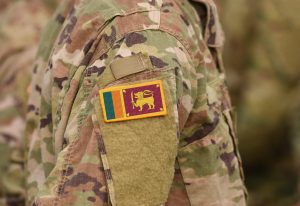Sri Lanka’s State Minister of Defense Premitha Bandara Tennakoon told Parliament on December 4 that the government is planning to enable women to rise in the military hierarchy and in time, to head the Sri Lankan Army, Navy, and Air Force.
Currently, a woman can only reach the rank of major, especially in the army in Sri Lanka. They are required to retire by the age of 45.
To rectify this, the government plans to change military laws to remove barriers that hinder women’s promotions to the higher echelons. The draft law, currently under review by the Attorney General’s Department, is slated for presentation before Parliament soon.
The decision aligns with Sri Lanka’s constitutional principles, which guarantee equality among all citizens. It also echoes progressive measures being undertaken by governments worldwide, including those in South Asia.
Reflecting on Sri Lanka’s history, Tennakoon underscored the prominent roles women have played and stressed the need for further efforts to secure their equal standing.
As of 2017, women constituted a mere 3.4 percent of Sri Lanka’s army, signaling a pressing need for transformative actions.
Since the end of the civil war in 2009, the Sri Lankan military has faced no major internal or external security threat that required its armed forces to engage in combat.
In times of peace, the landscape for women within a nation’s armed forces undergoes a significant transformation, offering an unprecedented opportunity for their amplified involvement and leadership roles. It provides a conducive environment for the reform of a country’s armed forces. Historical barriers that often hinder women’s ascent to higher echelons in military hierarchies during periods of conflict are more easily broken.
This shift allows for a more inclusive and diversified leadership framework, recognizing and leveraging the diverse skill sets and perspectives women can bring to critical domains like intelligence, strategic planning, and managerial capacities.
The move toward gender inclusivity in leadership positions not only aligns with global trends but also strategically positions a nation’s defense forces to effectively navigate contemporary challenges in an ever-evolving landscape of security and defense.
South Asia has been relatively slow in allowing women into leadership positions in the military. But things are changing across the region.
Highlighting a regional shift, Indika Perera, a defense and conflict resolution expert based in Colombo, pointed to South Asia’s efforts toward integrating women into military leadership roles. Recent milestones include the Indian Navy appointing its first woman commanding officer aboard a naval ship, aligned with their “all roles-all ranks” philosophy for female personnel. Additionally, India’s widening enlistment of women as Personnel Below Officer Rank indicates a progressive stance.
Moreover, Sri Lanka itself witnessed a historic moment with its first batch of female troops participating in a United Nations peacekeeping mission in 2022. Furthermore, the Sri Lankan Navy’s assignment of female personnel to sea duties earlier this year marked a significant milestone.
“The progressive nations in South Asia are carving out spaces for women within their armed forces because they recognize the valuable contributions women bring to the table,” Perera emphasized.
Comparatively, advancements in the police force have been more promising, with women attaining the rank of Deputy Inspector General (DIG) in 2021 — a historical milestone.
Tennakoon stressed the necessity of replicating such progress in the military to ensure women ascend to leadership roles. He drew attention to the government’s commitment, bolstered by President Ranil Wickremesinghe’s support to driving gender equality initiatives within the armed forces.
Pointing to Tennakoon’s track record of actionable commitment, Perera said that soon after announcing his government’s intent to reduce troop numbers, Tennakoon initiated the process of military restructuring. This underscores that he will take concrete action to ensure the removal of barriers to women’s promotion in the military.
Importantly, recent trends reflect a growing interest among women to join the tri-forces.
Drawing from experiences in developed countries, it’s evident that women excel in domains like intelligence analysis and human resources management. Notably, countries like Israel deploy women in frontline roles, especially for information gathering and intelligence analysis, setting a precedent for Sri Lanka.
These sectors — intelligence analysis and human resources management — are crucial for Sri Lanka’s future. “Given the interest and aptitude shown by women, achieving this objective shouldn’t pose significant challenges,” Perera affirmed.
As Sri Lanka gears up for the future, fostering gender inclusivity within its defense apparatus stands central to its strategic vision.

































